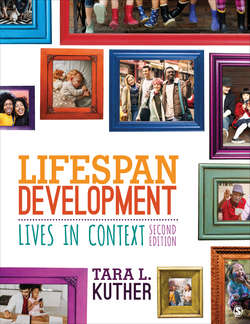Читать книгу Lifespan Development - Tara L. Kuther - Страница 73
На сайте Литреса книга снята с продажи.
Lives in Context Sociohistorical Influences on Development
ОглавлениеSociohistorical influences, such as the Great Depression (1929–1939), contribute to cohort, or generational, differences in development.
Photo12/UIG via Getty Images
Historical events, such as wars, times of prosperity, economic and natural disasters, and periods of social unrest, are contextual influences that shape our world and our development. The effect of historical events on development depends in part on when they occur in a person’s life (Elder et al., 2016).
The same historical event is experienced differently by successive cohorts, reflecting the fact that they are in different life stages, with different social roles, levels of maturity, and life experiences. For example, researchers examined the influence of the Great Depression (1929–1941) and World War II (1939–1945) on two cohorts of California-born Americans, followed from childhood to older adulthood, over a 70-year period (Elder & George, 2016).
These two cohorts offer striking examples of how sociohistorical context influences development.
The older Oakland cohort (born in 1920–1921) were children during the affluent 1920s, a time of economic growth in California, and they experienced a prosperous and relatively stress-free childhood. They entered adolescence during the Great Depression, a period of severe economic stress in which unemployment skyrocketed and people’s savings were depleted. As adolescents during the Great Depression, the Oakland cohort tended to behave responsibly and assist their families in coping. The boys often assumed jobs outside the home to aid financially troubled families, which enhanced their social independence and reduced their exposure to family stress. However, girls spent more time at home caring for siblings and performing household chores, as many mothers worked outside the home; they were exposed to greater amounts of family stress and showed poorer adjustment than did the boys. The Oakland cohort completed high school just prior to the onset of World War II, and over time, nearly all of the young men entered the armed forces.
Unlike the Oakland cohort, individuals in the Berkeley Guidance Study (born in 1928–1929) experienced the Great Depression during their vulnerable early childhood years. The children thus experienced economic scarcity and family discord early in life, at a time when they were very dependent on family. The Berkeley cohort entered adolescence during World War II, a period of additional economic and emotional stress resulting from empty households (as both parents worked to support the war effort) and the military service and war trauma of older brothers. As adolescents, the Berkley boys experienced greater emotional difficulties, poorer attitudes toward school, and less hope, self-direction, and confidence about their future than did the boys in the Oakland cohort. Like the girls in the Oakland cohort, the Berkeley girls spent time at home. They experienced stress but showed better adjustment than the Oakland girls, who experienced multiple stressors and transitions of adolescence (such as puberty and changes in social roles) simultaneously with the onset of the Great Depression.
Although the Berkeley boys tended to be troubled in adolescence, they demonstrated resilience in adulthood, largely because of the influence of military service. Three quarters of the males in the Berkeley sample served in the military between 1945 and the end of the Korean War in the early 1950s. The most disadvantaged young men tended to join the military early, and early entry into the military predicted personal growth. Military service appeared to offer several opportunities, such as the chance to begin again and reconsider their lives, to travel, and to take advantage of the GI Bill of Rights, which enabled them to expand their education and acquire new skills after the war.
These two cohorts of young people offer striking examples of how sociohistorical context influences development. Context always plays a role in development—not only in times of social upheaval but every day and for every generation.
